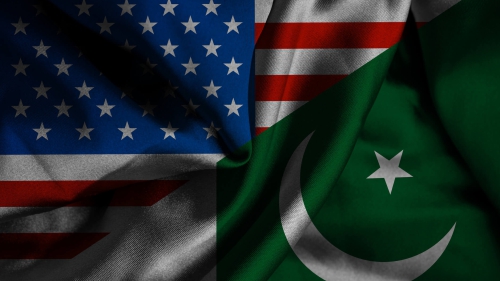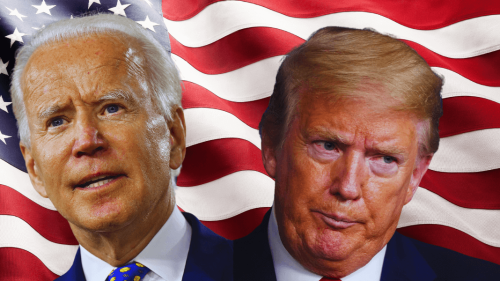Will the 2020 U.S. Election Heal or Deepen the Divide?

For a growing number of Americans on both sides of our ever-deepening political divide, the 2020 presidential election has become a critical contest about the future of our country. While so many significant policy concerns are at stake in November 2020, this will be an election about Donald Trump and what he has done to our politics.
There can be no doubt that, by any measure, Donald Trump has been the most outrageous president in our history. In fact, it is a role he appears to relish. It isn't just the policies he has pursued. It is the way in which he has exacerbated the polarization of our society and coarsened our political discourse.
Ever the performer, he has used his rallies to incite against his opponents, resorting to name-calling and even vulgarity to denigrate them. In addition, he has used his tweets and engagements with press to the same end. Despite the discomfort this has brought to the more staid members of the Republican establishment, they have, for the most part, held back from criticizing his behavior in part because they fear incurring his wrath and/or ridicule.
It's important to understand, however, that there is a method to this madness. What Trump has intuited is the anger of a significant portion of the American electorate that has been squeezed by a changing economy, threatened by cultural forces beyond their control, and ignored by the political elites in both parties.
Whatever they are called, whether it's the white middle class or white working class, this is the base to which Trump has played. And he has played them well. He has condemned both trade deals that he maintains have sent their factory jobs to Mexico and China in search of cheaper labor, and environmental regulations he claims have cost them their mining jobs. He has railed against immigrants whom he says have displaced hard-working Americans, and the "coastal elites" who have looked down their noses at ordinary folks, scorning their values and ignoring their aspirations. And he has preyed on people’s fears and insecurities by scapegoating Mexicans and Muslims.
When Trump says he'll "Make American great again," his base understands this as recapturing the country's lost glory, while at the same time evoking a romanticized past of quiet middle class neighborhoods free of crime, where work was plentiful, and opportunities were available to all who "played by the rules."
There are, to be sure, problems galore with both this messenger and the message. If anything, Donald Trump is the embodiment of the very "coastal elites" he derides. His business practices, values, and lifestyle are not those of his base. His bankruptcies have left tens of thousands out of work and his resorts have regularly hired undocumented cheap labor. His and his daughter's product lines have moved their operations overseas. And the policies he has pursued have benefited the wealthy and only increased income inequality. But none of this has mattered to his base - because he speaks directly to them and has convinced them that he alone understands them and will fight for them. Hungry for a savior, they have latched onto him as their "last, best hope" to improve their lot in life. As a result, they see attacks on his presidency as threats to their future well-being.
The dilemma now confronting Democrats is how to respond to this Trump challenge. On this, the many 2020 candidates and the party itself, are not of one mind. All are agreed that Trump's behavior is to be condemned and that moving forward with impeachment is a national priority and a constitutional imperative. But what about the divide and how to relate to Trump's base? Here there are divergent views.
Some appear to see no need to address this concern. They simply want to defeat the man, send him packing, and restore a Democrat to the White House. Others believe that the way forward is to heal the divide by preaching a message of unity and civility.
But while winning will obviously be an important goal for Democrats, governing in a post-Trump America is a critical concern that cannot simply be pushed aside. We have seen the dysfunction created by hyper-partisanship. When either party has controlled both the legislative and executive branches of government, bills get passed - but rancor only grows - recall the "Tea Party" reaction to Obama and the "Resistance" that greeted Trump. Winning, by itself, won't do the trick. Changing our politics and the governing coalition is what is required to move the country forward.
What polling makes clear is that our political divide isn't just partisan. It's really demographic. For too many election cycles political consultants using advanced data mining have identified target constituencies and directed their messaging and outreach efforts to reach them. For Democrats this has meant focusing on what has become known as the "Obama coalition" - including young voters, "minorities," educated professional women, etc. Republicans, on the other hand, have directed their outreach to their base - the wealthy, of course, and white, "born again," non-college educated, and rural voters. Democrats condemned inequality, promoted diversity and tolerance, and proposed a range of social programs designed to meet the needs of the most vulnerable. For their part, the Republican mantra has been "smaller government, lower taxes," coupled with a number of social issues (from abortion to anti-gay rights) to appeal to their voters.
In all of this, white middle class voters were left behind. The Democrats, who had been the champion of the working class, appeared to abandon them with their focus on a "liberal social agenda." While Republicans worked to lure them away from the Democrats by denouncing that same "liberal social agenda." What Trump did was couple the traditional Republican message with an appeal to the left behind middle class. He spoke to their anger and frustration and turned them into his MAGA movement.
If Democrats are to not only win, but erase the divide and change politics, they must break from their narrow focus on their base and speak to the crowd that Trump has co-opted. The strategy they have pursued of focusing exclusively on increasing the voter turnout of their base and directing their anger at Trump, may win an election, but it will do nothing to change and expand the governing coalition. They need to be able to continue to appeal to their base, while also speaking directly, as Trump has done, to the anger and frustration of the left behind working class - of all races. Winning and transforming American politics means adopting a "both/and" instead of an "either/or" approach to politics. Ignoring or just trying to get more votes than the "other side," will only perpetuate the divide. And lame calls for unity and civility fall flat when people are hurting, frustrated, and mad. Only by recognizing that hurt, acknowledging that frustration, and sharing that anger can voters become unified around an agenda that speaks to all Americans across the divide.
Maybe then we can begin to heal.
Topics: 2020 United States Elections, Democracy, Democratic Party (United States), Donald Trump, Elections, Republican Party (United States)
Views: 1233
Related Suggestions

















